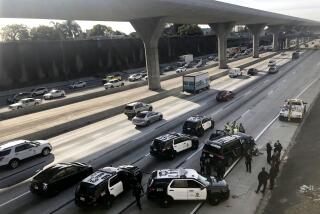Will ‘Need for Speed’ make the surge in racing films backfire?
This weekend, millions will turn out to see “Need for Speed,” DreamWorks’ heavily promoted, erratically constructed car-racing/man-on-a-mission movie. Or so the studio hopes.
With its Super Bowl ad and ABC prime-time tie-ins, distributor Disney has been pushing the pedal to make “Need for Speed” a broad hit. But just as important as (and, in fact, related to) the question of whether it can pull that off — an estimated $25 million to $30 million weekend doesn’t exactly make a blockbuster — is how the film throws a monkey wrench into the modern car-chase movie. And not necessarily the good kind of monkey wrench.
If you think you’ve been seeing a lot of driving movies in the last few years, you’re right. The racing genre ebbs and flows, and lately it’s been gushing. There’s, of course, the “Fast & Furious” franchise, which will come back with a seventh installment next year, but also Ron Howard’s Formula One movie “Rush,” the Ayrton Senna doc “Senna” before it, Nicolas Winding Refn’s “Drive” — not to mention animated movies such as “Cars 2” and a good chunk of “Wreck-It Ralph.”
REVIEW: Next to ‘Fast & Furious,’ ‘Need for Speed’ stalls out
All of these movies have succeeded on either a critical or commercial level, and pretty much all have been satisfying to watch. And that’s because, though they’re about as far apart as you can get, they all master a subgenre of some kind: “Drive” the at once ethereal yet violent mood piece, “Fast & Furious” the springtime thrill-ride, “Rush” the classic Hollywood character-based entertainment.
But “Need for Speed” may be something else: the first driving movie that wants to be like all driving films. It’s packaged as “Fast & Furious,” has aspirations to “Drive” and comes off as a paler “Cannonball Run,” or a “Death Race 2000” without the dystopia. (If you’re heading out to see it this weekend, write and let us know what you think of it.)
Centering on Tobey, a taciturn mechanic and master street driver (Aaron Paul), it imagines what happens after he watches a good friend die in a street race and is then framed for the murder, eventually leading him and love interest Imogen Poots on a cross-country, law-flouting joy ride (“Cannonball Run,” check, with some “Bonnie & Clyde” detours) so the pair can reach an underground car race narrated by a grating, omniscient broadcaster (“Death Race 2000,” check).
Though it’s based on a video game and directed by stunt master Scott Waugh to include plenty of loud and admittedly exciting road-level racing scenes (“Fast & Furious,” check), “Need for Speed” comes packaged in surprisingly melancholy wrapping. There’s a cloud of loss hanging over the movie, right down to its persistent downbeat score, and a grim-faced expression on several of the main actors, including Paul, doing his best Ryan Gosling cum Steve McQueen (“Drive,” check and check again).
PHOTOS: Celebrities by The Times
That tone may be explained by the presence of screenwriters George and John Gatins — the latter responsible for another transportation-themed redemption story in “Flight” — while the reluctance to simply embrace the “Fast & Furious” fun of it all may explain some of the weak reviews (currently just 23% on Rotten Tomatoes).
We’ll see how it all shakes out in the coming days with audiences, but suffice to say that a hit is needed for DreamWorks, which since “Lincoln” 15 months ago hasn’t had reason to take many victory laps. (“Delivery Man,” anyone?) But the lesson seems to be about more than just one film or studio. It’s about how a genre can be humming along one minute and stalling out the next. Racing is popular on-screen, sure, but the best movies in any category know where they fit in. With “Need for Speed,” the driving renaissance continues. But it can’t continue in all directions at once.
ALSO:
‘Need for Speed’ could cruise to box office win this weekend
Movie review: ‘Need for Speed”
Follow me on Twitter at https://twitter.com/ZeitchikLAT
More to Read
Only good movies
Get the Indie Focus newsletter, Mark Olsen's weekly guide to the world of cinema.
You may occasionally receive promotional content from the Los Angeles Times.











